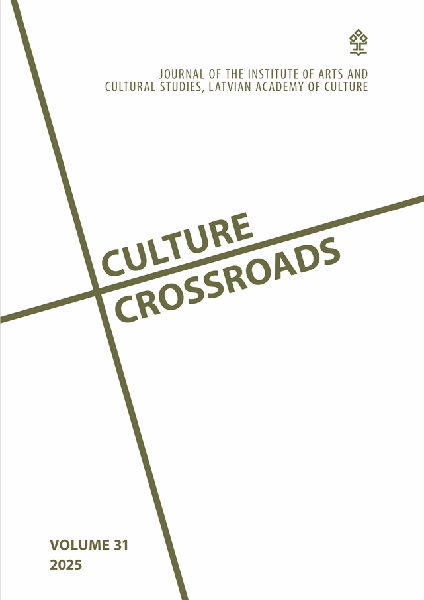About the Journal
Culture Crossroads is an international peer-reviewed journal published by the Institute of Arts and Cultural Studies of the Latvian Academy of Culture. The goal of Culture Crossroads is to develop and expand theoretical and methodological approaches to the research of art and creativity with emphasis on the potential of a variety of disciplines and interdisciplinarity. The main focus of the publication is on the interaction of cultural, artistic and creative processes as well as the synergy between them and other domains of national economy, politics and social life. It is targeted on the most topical issues and discussion points in culture studies and arts. The publication is open to research in the fields of ethnology, theory of culture, semiotics, cultural anthropology, museology, cultural heritage, management of culture, sociology of culture and art, cultural economics (including creative industries), cultural politics, audio-visual art, performing arts, dance, theory of literature, musicology, law, linguistics, or other domains of culture studies and arts.
Culture Crossroads is indexed in: SCOPUS; EBSCO (Humanities Source Ultimate); ERIH PLUS; ULRICH'S; Central and Eastern European Online Library (CEEOL).
According to the latest data from Scimago, Culture Crossroads was in the second quartile in the thematic area “Arts and Humanities (miscellaneous)” in 2023.
Current Issue

The regular volume of “Culture Crossroads” in 2025 is particularly rich: it includes 14 scientific articles, grouped under five headings: “Contemporary artistic practices and creativity”, “Cultural heritage and ethnology”, “Identity construction, migration, and feminism”, as well as “Memory studies and mnemohistory” and “Theatre, film and performance studies”. The authors of this volume represent a range of scientific institutions in Latvia, as well as Estonia, Finland, the Netherlands, and Portugal. From legal aspects of creativity to methodological aspects of researching migrants, from creative intermediaries to Arab feminism – the scope of the volume is broad, but taken together, the articles form a snapshot of the current cultural and creative landscape.

